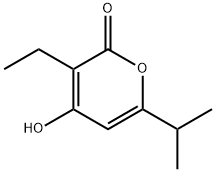Germicidin A is a pyranone originally derived from S. viridochromogenes that acts as a reversible, autoregulative inhibitor of spore germination and hyphal elongation in the genus Streptomyces at concentrations as low as 200 pM. During germination, spores of Streptomyces excrete germicidin A along with other germicidin homologs, which inhibit germination of its own arthrospores. At higher concentrations, germicidin A can inhibit the porcine Na+/K+-activated ATPase (ID50 = 100 μM) and prevent the germination of the cress L. sativum.
Germicidin A is an extremely potent autoregulator.
Germicidin A is a pyranone isolated from Streptomyces sp. in 1993. Germicidin A is an extremely potent autoregulator of the sporulation of the producing strain, and spores of closely related species. Inhibition is detected at 0.1 ng/ml and is orders of magnitude more potent than a diverse range of antibiotics.
[1] petersen f, zhner h, metzger j w, et al. germicidin, an autoregulative germination inhibitor of streptomyces viridochromogenes nrrl b-1551[j]. the journal of antibiotics, 1993, 46(7): 1126-1138.
[2] aoki y, matsumoto d, kawaide h, et al. physiological role of germicidins in spore germination and hyphal elongation in streptomyces coelicolor a3 (2)[j]. the journal of antibiotics, 2011, 64(9): 607-611.
